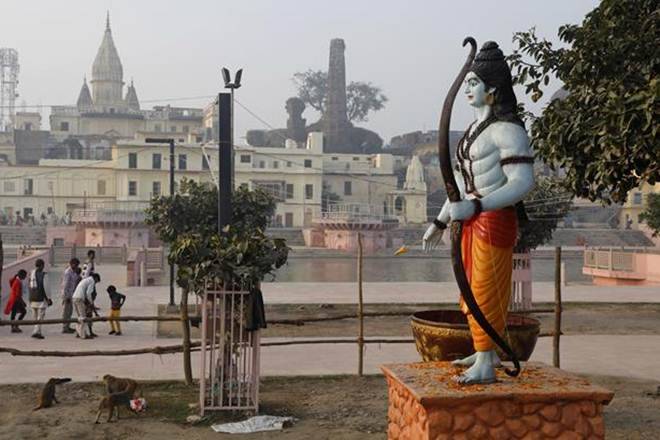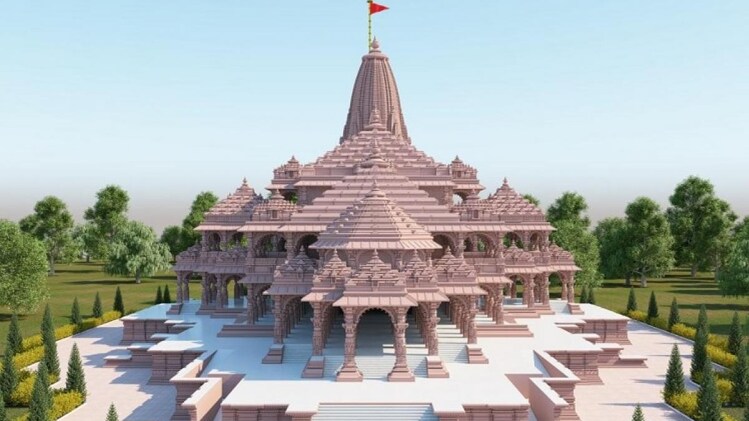One of the most remarkable constructions under progress is the Hindu Temple, Ram Ayodhya Mandir, located in Ayodhya of Uttar Pradesh. The construction of Ram Mandir is going to be conducted on the ground site where Lord Rama had taken birth.
Bearing the ongoing construction in progress, to shape the temple into a design made by the Sompura Family, a recent ceremony of the Temple was held on the 5th of August, 2020. The ceremony included Bhoomi Pujan which was a significant event, amid the celebration. That being said, hundreds of people across the village had gathered around to witness the ceremony while a picture of the temple, and it’s structure circulating on various social media feeds.
Many people are still wondering about the temple and what else to expect while it remains under construction. Well, if you too are curious about Ram Mandir, then read more below on Uttar Pradesh Hindi news on Ram Mandir!

12 Unknown Facts You Need to Know About Ayodhya Ram Mandir
So far, almost everyone knows Ayodhya Ram mandir will soon finish its construction work and become ready, allowing people to visit. However, there are some relevant facts and important historical marks that are unknown to many people. These facts add more weight to the Temple. Here are top unknown facts about Ayodhya Ram Mandir:
1. Holy Soil Across 2587 Regions
One of the most fascinating facts about Ayodhya Ram mandir’s construction is the foundation layout, made using the holy soil that comes from 2587 regions. For instance places like Jhansi, Bithoori, Yamunotri, Haldighati, Chittorgarh, Shivaji’s Fort, Golden Temple, and many other holy places contribute to its foundation.
2. Largest Temple in India
Ram Mandir is going to be the largest Temple in India as per it’s design structure. The Sompura family who designed the Temple had also discussed that the design was made 30 years ago by Chandrakant Sompura’s son, Ashish Sompura. According to the family, the height of the Temple reaches approximately 161 feet along with 28,000 square feet of area.
3. Time Capsule Underneath the Temple
Based on many Uttar Pradesh news sources, it has been revealed that authorities will place a time capsule almost 2000 feet below the ground right underneath the Ayodhya Ram mandir Temple. According to reports, the sole purpose of placing a time capsule is to protect the identity of the temple so that it does not get forgotten in the future. The capsule will hold relevant information written on a copper plate, regarding Ram Mandir, Lord Ram, and his birthplace, Ayodhya.
4. Unresolved Survey on Mythological Temple
According to Uttar Pradesh news sources, an archaeological survey suggests that the Babri Mosque was built upon a pre-existing old structure. The court was considering the surveys. Other surveys suggest that the pre-existing structure is of Ram Temple from Lord Ram’s era. However, Sarvepalli Gopal, an Indian Historian suggests that traces of human civilization in Ayodhya only dates back 2800 years ago. On the other hand, legends of Lord Ram go back beyond 5000 years ago.
5. 150 Holy River Water Combine
The holy ceremony on 5th August was having a special holy water with a foundation layout in which holy water was from 150 holy rivers across India. The combination of these river waters came from a family of two brothers, Shabd Vaigyanik Mahakavi Triphala and Radhey Shyam Pandey. The combination of this holy water is a mixture of three seas, eight rivers, and soils of Sri Lanka. Additionally, Mansarovar water was also a part of the combination. Along with that, water from a Durga Temple worth 600 years old in West Jaintia Hills, river water from Myntang and Myntdu was also a part of the holy water mixture.
6. No Use of Iron Steel in Construction
According to many sources of Uttar Pradesh news, Ram Mandir will be completely made of stones. No steel or iron will be used in the making of the temple. Even Anu Bhai Sompura, the supervisor of the construction project declared that instead of iron, other elements like copper, White Cement, and Wood will be used.
7. Monetary Donation for Construction
Apart from the essential supply for the construction, many higher authorities have donated monetary values upon Ayodhya Ram mandir’s construction by a large margin. For instance, CM, Adityanath Yogi provided approximately 11lakhs, Keshav Prasad Maurya Bapu, Uttar Pradesh’s Deputy CM donated 6.60 lakh while Morari Bapu donated 5 Crore.
8. Exquisite Features in Temple Design
As many resources of Uttar Pradesh Hindi news speak, the temple is of two-stories with a height of 128 feet, length of 268 feet, and a width of 140 feet. On the ground floor of the temple, the surrounding design will depict the story of Lord Ram, his birth, and his childhood.
On the first floor, the design structure will depict Lord Ram’s Darbaar. One of the most unique features of the temple is the use of Bansi Paharpur, pink sandstone in construction, collected from Rajasthan’s Bharatpur. Alongside, reports claim that 360 pillars will be made exclusively with a design of Nagar Style.
Meanwhile, the 57 acres of land will comprise a temple complex with 10 acres will be for the Temple Construction. The remaining areas would consist of four small temples surrounding the Ram Mandir.
9. Special Bricks Used for Construction
According to Ayodhya news, in order to build the Temple, special bricks inscribed as “Shri Ram”, will be used. Among the use of these bricks, some of them have not been of use over a time span of 30 years. These old bricks also have another name, called “Ram Shilas”.
Before Ayodhya was occupied with Shilanyas, till 1989, all the devotees across the country would collect these bricks. Meanwhile, a special batch of bricks is currently under the progress of development by a brick owner at UP. The batch of bricks has a certain formula of Domath Soil having a name inscription of Lord Ram. Ayodhya Ram mandir construction will receive 51,000 of these bricks as a donation which weighs 3 kg each.
10. Additional Funds for Revamping Temple Town
Ram Mandir makes a significant mark in Ayodhya. A place that will now have a significant mark on those who didn’t know about it before. According to sources, the entire town will go through a makeover. Starting from new developments and other projects PM Modi is all set to bring out development projects that are worth 500 Crores.
Among these new developments, the project will include the expansion of the National Highway 30 into four lanes between Bahraich and Azamgarh through Ayodhya. Other projects like making modern bus stations, providing law enforcement police barracks within an amount of 200 people, and more.
11. Special Sculpture Work
Based on Ayodhya news reports, Ranjit Mandal, a sculptor from Assam district, has been dedicatedly making statues of Lord Ram. His work depicts his journey of life, through childhood until his coronation.
However, these works will be under the display section in Ram Mandir’s courtyard. To be precise, these works will include the Ram Katha Kunj with major scripts. As of now, approximately 125 of them that depict Ram’s entire life journey will be on display.
12. Special Stones
Ayodhya news, as well as Uttar Pradesh Hindi news, says that Anjanadri Hill which is in Karnataka. It is also the birth-place of Lord Hanuman. Thus, Ram Mandir’s construction will also include stones from the birth-place of Lord Hanuman.
Finally!
The construction of Ram Mandir is still in fast progress. On that account, there are other facts about Ram Mandir that will soon be revealed as the progress moves forward. Stay updated through Ayodhya news or Uttar Pradesh Hindi news for more information.













